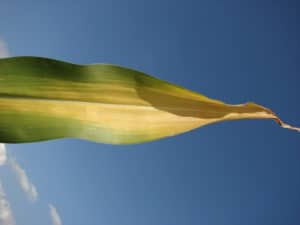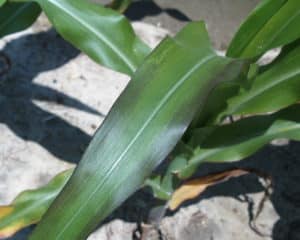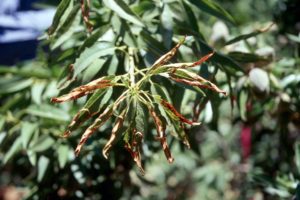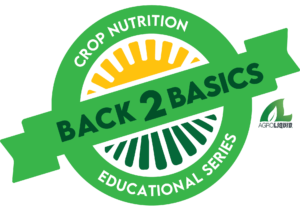Nitrogen (N), phosphorous (P), and potassium (K) are all required by crops in the largest amounts and are often considered the most important nutrients to a plant’s development and growth. They support the most essential functions of the plant, protecting it, and promoting its growth. Defining an N, P, or K deficiency, and reversing it, in your crop is important to achieve your highest and most profitable yield.
When questions arise about your crops needed nutrients or deficiencies, contact your AgroLiquid representative or visit us at AgroLiquid.com.
 Nitrogen Deficiency
Nitrogen Deficiency
Nitrogen is a primary plant nutrient. It is one of the more mobile nutrients, being moved throughout the plant to areas where it is most needed. Nitrogen is taken up by plants mainly in the nitrate (NO3_) or ammonium (NH4+) forms and is used to synthesize amino acids. These make up the proteins contained in the protoplasm of all cells within the plant. Nitrogen is also vital to chlorophyll and enzymes.
How a nitrogen deficiency looks
A deficiency of nitrogen can manifest in a number of ways. The most common symptoms are stunted growth, lower yields, and small fruit size. In crops such as corn, a nitrogen deficiency appears as light green to the yellow coloring of the leaves, showing on older leaves first and starting mid-rib and moving outward to the leaf margin.
Affect on Yield
Nitrogen plays a major role in increasing yields. There is a direct correlation between the amount of available nitrogen and a crop’s yield. Nitrogen is required in large amounts during periods of rapid vegetative growth or regrowth. It is a building block for amino acids and proteins and acts as a catalyst for other nutrients. When applied early, nitrogen also increases the size and quality of fruit.
AgroLiquid nitrogen-containing products
High NRG-N™, NResponse™, fertiRain™, FASE1, Fase2™, NutriRain™ 20-0-2, NutriRain™ 17-3-2, Pro-Germinator®, Sure-K®, Kalibrate™, GrowRight ™.
 Phosphorus Deficiency
Phosphorus Deficiency
Phosphorus is a primary plant nutrient. It stimulates root, flower, and fruit development and overall crop maturity. Phosphorus is necessary for energy transfer and the formation of RNA and DNA. Most plants require additional phosphorus during cold weather, in areas of limited root growth, during rapid vegetative growth, and in highly calcareous or acidic soils. The higher the clay content in the soil the more immobile it becomes.
How phosphorus deficiencies look
The older leaves of your crop will be affected first by a phosphorus deficiency, with leaves taking on a darker green or purple color. Plant growth will also generally be stunted causing plant maturity to be delayed. In severe cases, a phosphorus deficiency will cause plant leaves to curl upward.
Affect on yield
Phosphorus speeds up plant maturity and promotes seed production. It also increases water use efficiency and contributes to disease resistance. Phosphorus is most readily available in soils with a pH of 6.5–7.0. At a higher pH it becomes fixed (tied up) by calcium and at a lower pH, it is tied up by aluminum and iron.
AgroLiquid phosphorus-containing products
Pro-Germinator®, Sure-K®, FertiRain™, FASE1™, FASE2™, GrowRight™, NutriRain™ 17-3-2
 Potassium Deficiency
Potassium Deficiency
Potassium is a primary plant nutrient. It is essential for the transport of sugars and the formation of starches and oils. Potassium helps to regulate the opening and closing of a leaf’s stoma, which are important for the efficient use of water by a crop.
How a potassium deficiency looks
A potassium deficiency in plants causes slow growth as well as lowered fruit sugar content and shriveled seeds. It can be identified by burnt leaves and weak stems and stalks causing lodging.
Affect on yield
Potassium promotes root growth and, increases a plant’s resistance to disease and cold temperatures. It also improves the size and quality of fruits, nuts, and grains, and it is essential for high-quality forage. Crops that produce large amounts of carbohydrates (sugars) require large amounts of potassium, for example, cotton, almonds, alfalfa, grapes, cherries, and peaches. Typically, only 1-2% of conventional potassium fertilizers applied to the soil is available at one time. Multiple applications of potassium during a season are often beneficial.
AgroLiquid potassium-containing products
Sure-K®, Kalibrate™, Pro-Germinator®, FertiRain™, Fase2™, GrowRight™, NutriRain™ 20-0-2, NutriRain™ 17-3-2.
Back 2 Basics
A great, free, resource to learn all about the role that different nutrients play in plant health and development is the Back 2 Basics video series. These short videos take an in-depth look at each of the nutrients that may make a difference in a crop and help to understand the role that each plays. Learning the ins and outs of how one nutrient interacts with another in the soil is a key step in meeting a plants full potential. Register for the Back 2 Basics series here and receive a notification when new episodes become available.


 Phosphorus
Phosphorus Potassium Deficiency
Potassium Deficiency